|
|
|
Sort Order |
|
|
|
Items / Page
|
|
|
|
|
|
|
| Srl | Item |
| 1 |
ID:
080324
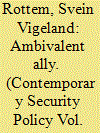

|
|
|
|
|
| Publication |
2007.
|
| Summary/Abstract |
NATO's future has long been in question, with the core of the debate revolving
around America and other great powers. This article finds comparable tensions
among smaller members. Examining the case of Norway, it argues that since the
end of the Cold War, Norway has lacked a clear mandate for its role in NATO,
and as such should be considered an ambivalent ally. This ambivalence is seen
when Norway reluctantly follows through on NATO policy. NATO's readiness to
act in the High North also is questioned.
This article examines Norway's NATO relations in four dimensions, collective
defence and collective security, position and values, influence and national priorities,
scepticism and reliability. Here realism and constructivism can provide us with an
analytical backdrop to explain Norwegian ambivalence. International power structures
create and constrain windows of opportunity for Norway, but national and international
norms and identity should not be left out of the analysis. Norway is entangled
in realist politics, but the legacy of neutrality and the perception of Norway as a
peaceful nation cannot be ignored. The result of this tension is Norway's unsettled
relationship with the new NATO.
|
|
|
|
|
|
|
|
|
|
|
|
|
|
|
|
| 2 |
ID:
080317
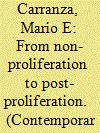

|
|
|
|
|
| Publication |
2007.
|
| Summary/Abstract |
How can the reversal in American policy toward South Asia from the Clinton administration's
strong condemnation of the Indian and Pakistani nuclear tests of May 1998
and the enforcement of American non-proliferation legislation to the lifting of sanctions
and the de facto recognition of India and Pakistan as nuclear weapon states be
explained? The Indian-American nuclear deal of March 2006/July 2007 is examined
here through alternative theoretical perspectives to explain the American reversal.
Defensive realism and social constructivism offer the strongest explanations for the
shift under the Bush administration. Both can be used to explain a deal that makes
major concessions in previous American policy. They also help draw attention to
the problems arising from a situation where the future of Indian-American relations
will depend not only on Indian but also American actions. The nuclear deal, it is concluded
here, could irreparably damage the Non-Proliferation Treaty while increasing
the danger of actual use of nuclear weapons in a future Indo-Pakistani war
|
|
|
|
|
|
|
|
|
|
|
|
|
|
|
|
| 3 |
ID:
080323
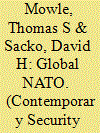

|
|
|
|
|
| Publication |
2007.
|
| Summary/Abstract |
NATO must adapt to the structural imperatives of a unipolar world, or become
increasingly irrelevant. The Global NATO initiative of 2006 would have begun transformation
of NATO into a more flexible, effective, and legitimate organization. The
benefits of NATO globalization are greatest for the United States. Unipolarity means
Downloaded By: [Inst for Defence Studies & Analysis] At: 07:12 18 February 2008
that the United States does not need allies to ensure its security, but the United States
nevertheless receives value from the existence of a pool of capable states whose
equipment and training allow them to operate together. Unipolarity means that
other states will be more likely to bandwagon with the United States than to
balance against it; laundering that cooperation through an institution can enhance
those other states' influence. A NATO expanded to include states that share
common interests with the United States, acting in more flexible coalitions rather
than always as a whole, would meet these goals. It would also be more effective
and legitimate as an organization, since it would include greater military resources
from a more diverse collection of countries
|
|
|
|
|
|
|
|
|
|
|
|
|
|
|
|
| 4 |
ID:
080320
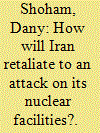

|
|
|
|
|
| Publication |
2007.
|
| Summary/Abstract |
The issue of a military strike on Iranian nuclear facilities to halt progress towards
nuclear weapons is intensifying. This paper attempts to comprehend that possibility,
along with its implications. It does not deal with the prospects for a military strike
against Iran. But, since such an attack may take place, the present analysis inquires
into the feasibility of non-nuclear, WMD-based Iranian retaliatory options, strategically
and operationally, in case the attacker does not intend to eliminate those
options, in conjunction with targeting nuclear facilities. Beyond the scope of this
paper are the various ways to counter Iranian CBR weapons. This analysis supposes
the absence of Iranian nuclear weapons at present.
It is concluded that Iran endeavours to sustain rapid retaliatory capabilities by
non-nuclear WMD in case its nuclear facilities are attacked. Iranian leaders also
have the ability to choose to retaliate at once. A preemptive attack cannot focus exclusively
on Iran's nuclear establishment. To be effective, it also must incapacitate
Iranian CBR weapons, immediately before or in conjunction with the destruction
of nuclear facilities.
|
|
|
|
|
|
|
|
|
|
|
|
|
|
|
|
| 5 |
ID:
080319
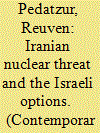

|
|
|
|
|
| Publication |
2007.
|
| Summary/Abstract |
As a result of developments including the overthrow of Saddam Hussein, Muammar
Al-Qaddafi's decision to cease WMD programs, and the weakening of the Syrian
Downloaded By: [Inst for Defence Studies & Analysis] At: 07:12 18 February 2008
military, only one potential strategic threat against Israel remains: the Iranian nuclear
program. Iran's acquisition of nuclear weapons is likely to transform the Middle
East's strategic balance, force changes in Israel's national security planning in
general and its nuclear policy in particular.
This article analyses the options open to Israel in response to a nuclear Iran, and
the advantages and disadvantages of each. Evaluation of the options available to
Israel reveals seven alternatives. In the near future, Israeli decision makers will
have to decide whether to adopt one or a mix of options ranging from preemptive
attack to unconcealed nuclear deterrence. After analysing each of these options, the
conclusion is that Israel probably will move to unconcealed nuclear deterrence in
the event of Iran completing the development and the acquisition of nuclear weapons.
|
|
|
|
|
|
|
|
|
|
|
|
|
|
|
|
| 6 |
ID:
080321
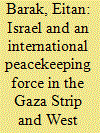

|
|
|
|
|
| Publication |
2007.
|
| Summary/Abstract |
Following the establishment of an apparently successful peacekeeping operation
(PKO) in South Lebanon after the July 2006 war, the idea of deploying a similar operation
in the Israeli-Palestinian was raised by European leaders and the Palestinian
Authority. Israel was quick to reject this proposal. However, the June 2007 Hamas
seizure of power in the Gaza Strip has softened this stance, with Israel reappraising
the issue. Based on experience with the two peacekeeping forces (UNDOF and
UNIFIL), the article assesses the potential impact of a Palestine-oriented PKO for
Downloaded By: [Inst for Defence Studies & Analysis] At: 07:12 18 February 2008
Israel. The article defines the most relevant operational functions for such a PKO,
specifically: to make defection difficult, to increase confidence in the arrangement,
and to serve as a conduit for communication between the sides. The article then
reviews recent precedents for success, explaining why UNDOF succeeded in fulfilling
expectations, whereas UNIFIL has not. By exploring the reasons for Israel's opposition
to another PKO, the article elaborates on the salience of the parties' ability to
suppress violence. A key factor in Israel's decision should be whether Palestinian
entities (in Gaza or the West Bank) have the capacity to control violence or will
apply it. In its absence, Israel's troubled experience with UNIFIL should serve as
the relevant guide.
|
|
|
|
|
|
|
|
|
|
|
|
|
|
|
|
| 7 |
ID:
080315
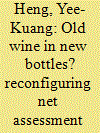

|
|
|
|
|
| Publication |
2007.
|
| Summary/Abstract |
Net assessment as a framework for security analysis last triggered vigorous discussion
in the closing stages of the Cold War. Nearly two decades later, this paper argues that
net assessment deserves to be revitalized and looked at again, as governments seek
analytical tools to understand the strategic environment in order to properly shape
their foreign and security policies. Drawing from Cold War academic debates on
net assessment, this paper first clarifies its definitions, origins and methods, highlighting
its strengths, failures and weaknesses. It then examines whether and how net
assessment might be modified and brought forward into the 21st century as an analytical
framework for two strategic problems: the War on Terror and the Iraqi insurgency.
The essay concludes that greater attention should be paid to net assessment, both
to address an urgent need for analytical tools to understand post-Cold War
exigencies, and as a remedy to the worst-case scenarios that have dominated
post-9/11 strategy.
|
|
|
|
|
|
|
|
|
|
|
|
|
|
|
|
| 8 |
ID:
080318


|
|
|
|
|
| Publication |
2007.
|
| Summary/Abstract |
American officials have long proclaimed the importance of missile defence
cooperation with Russia, and bilateral cooperation on the issue is an obvious solution
to missile defence security dilemmas. What are the prospects for bilateral cooperation
on missile defence? The year 2007 witnessed an unprecedented missile defence controversy,
arising from American plans to base new defence installations in Europe,
ostensibly to counter the threat of long-range missiles from Iran. Russian leaders,
most prominently President Vladimir Putin, harshly criticized these plans for undermining
Russian security and demanded the United States drop its proposal. Instead,
Putin offered use of a Russian radar in Azerbaijan to detect missiles from Iran.
This article reviews two earlier attempts at bilateral cooperation: the Russian-
American Observation Satellite (RAMOS) and the Joint Data Exchange Center
(JDEC). One was cancelled. The other has been stalled in endless negotiation.
Neither example bodes well for future missile defence cooperation. The technical
and logistical difficulties of creating and operating bilateral Russian-American security
programs, when combined with residue of Cold War mistrust, make intensive
Russian-American missile defence cooperation extremely unlikely
|
|
|
|
|
|
|
|
|
|
|
|
|
|
|
|
| 9 |
ID:
080316
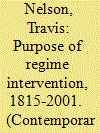

|
|
|
|
|
| Publication |
2007.
|
| Summary/Abstract |
This article is an examination of an understudied yet clearly significant international
phenomenon: military intervention explicitly directed at regime change in a target
state. The article argues that regime interventions are best understood not dyadically,
but regionally. They are primarily attempts to stabilize regional interests of
the intervening state. This hypothesis is tested through statistical analysis of
intervention between 1815 and 2001. The statistical results indicate that regime
interventions are marked by a strong connection between the intervening state
and the target region and by direct instability within that region prior to the
intervention.
This finding calls into question the dyadic assumptions of much empirical work
on international conflict; regional perspectives need to figure more prominently.
This suggests, for example, that the 2003 invasion of Iraq is less about Saddam
Hussein or direct access to Iraqi oil, but a signal of American commitment to
the broader Middle East. This intervention, like most other regime interventions,
is regionally motivated, not dyadic. Regime interventions occur when a region is
undergoing instability and an intervening state believes it must signal commitment
to regional stability. While interventions in Iraq and Afghanistan make
sense within this context, similar actions in North Korea and Iran seem much
less likely.
|
|
|
|
|
|
|
|
|
|
|
|
|
|
|
|
| 10 |
ID:
080322
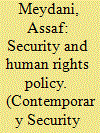

|
|
|
|
|
| Publication |
2007.
|
| Summary/Abstract |
When are interrogators exempt from criminal responsibility by the imperative to
acquire information that might save lives endangered by terrorist attack? This
article uses the Israeli example to show that aspects of security policy previously
assumed to be based on independent foundations actually results from political bargaining.
Interrogation of terrorist suspects is governed instead by bargaining
between political leaders, civil servants and interest groups, all of whom function
in an environment conditioned by non-governability, judicialization, and an alternative
political culture.
This article examines tensions between human rights and domestic security
through a detailed analysis of the dispute over interrogation methods by the Israeli
General Security Service (Shin Beth), which resulted in the Israeli High Court of Justice's
Interrogation Decision of 1999. While most studies deal with security culture as
a belief that determines polices, this article elaborates on the input of various political
actors who operate within a complex of variables. The article examines the alternative
culture in Israel that has a powerful effect on the creation of public security
policy. The gridlock created by competing governmental institutions has prompted
judicial intervention in many areas. Faced with a paralysed government, interest
groups have created an alternative political culture, stressing action through the
courts. Accelerated judicial activism has the effect of diminishing respect for the
law in the eyes of the public.
|
|
|
|
|
|
|
|
|
|
|
|
|
|
|
|
|
|
|
|
|